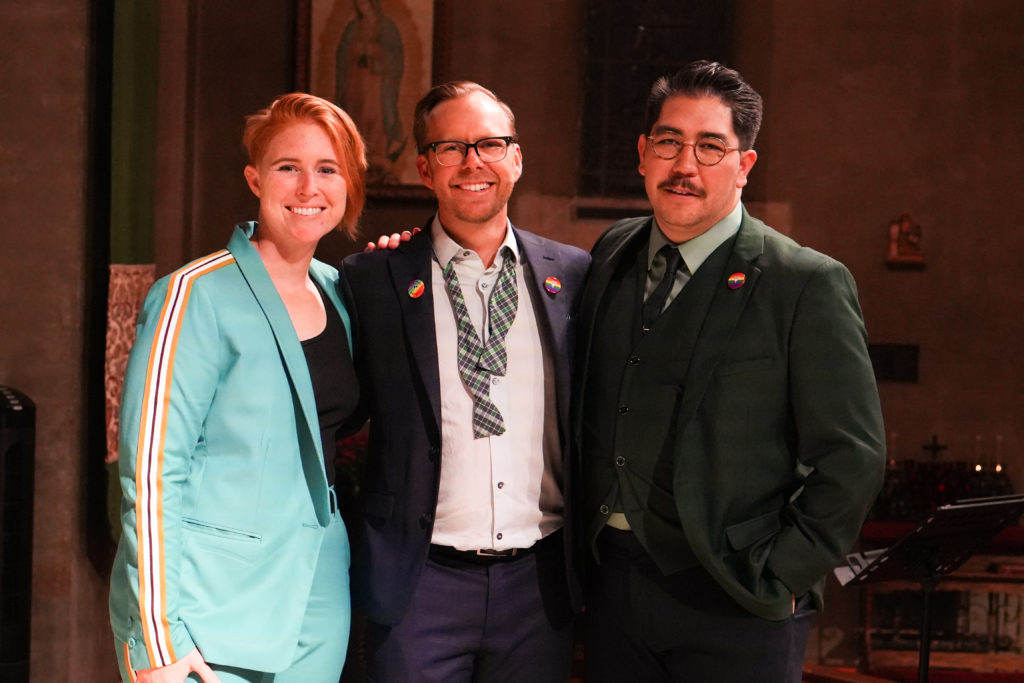Sacra/Profana Premieres Cory Hibbs’ Cantata ‘All We Need: Meditations on Queer Being’
Under the direction of Juan Carlos Acosta, the San Diego choral ensemble Sacra/Profana premiered Cory Hibbs’ much anticipated All We Need: Meditations on Queer Being Saturday at St. Paul’s Episcopal Cathedral. Based on an autobiographical text written by the composer, this 75-minute a cappella work for chorus and a quartet of soloists is not easy to categorize. Choral works of this scope are usually highly dramatic works accompanied by an orchestra, e.g. Handel’s oratorio Israel in Egypt or William Walton’s cantata Belshazzar’s Feast.
Hibbs’ cantata is both a probing reflection on the identity of an individual from the LGBT community and a vivid recounting of learning to express that identity in a society where acceptance is rarely a given. In 21 concise movements Hibbs narrates this journey in a moving progression that brought to mind another expansive a cappella cantata, Hugo Distler’s 1934 Totentanz, a work comprised of 14 individual motets that narrates the final moments of individuals from every class of medieval society.Hibbs’ musical style, a fluid modality that favors close harmonies, played to the strengths of Sacra/Profana, an ensemble of 20 well-matched voices whose sections elegantly balanced and complemented each other. Hibbs’ choral writing abounds in long melismatic lines, although at times he is content to reduce a phase to a single word and linger on it.
The major challenge of Meditations on Queer Being is communicating its substantial text. Although Hibbs’ poetry is concise, he has a lot to say, and the cantata’s complete text spread over several pages of the program. Fortunately, when the composer speaks in first person voice, these lines have been assigned to the soloist, Adam Davis. His rich bass baritone, eloquent declamation, and earnest equanimity could not have been more persuasive. Like the role of the Evangelist in a Baroque Passion, Davis’ vital narration propelled this cantata.
Some of the score’s more complex choral exposition was assigned to a trio of soloists, sopranos Calieanne Grossheim and Libby Weber, and alto Lara Korneychuk. Like Davis, this trio of soloists brought conviction, vocal allure and definition to their roles. At the center of the cantata, in the movement “Can You Feel It?” that obliquely describes a Pride parade, these soloists and Davis joined together in a thrilling hymn that captures the cantata’s message: “Beautiful one, you are born of love, to show love . . . this is your call.”
The full chorus takes on several roles, at times supporting the trio of soloists, but also sections of sustained ensemble declamation as in the movement “Roots drink from Stones.” If Hibbs favors an easy-going chordal declamation, he has also taken a cue from Puccini’s Madama Butterfly by included two effective humming choruses.
Throughout the cantata, true to its designation as a meditation, Hibbs maintains a reflective stance. However, the work is not without its dramatic moments. In a romantic encounter described in the movement “We Sat, Side by Side, in the Car,” the chorus erupts in an exuberant flash of vibrant melismas. And as Hibbs unfolds his hard-won conclusions in one of the closing movements “Home is Not a Place,” the chorus crescendos to a jubilant fortissimo affirmation repeating the cry “Yes, I am.”
Because Hibbs’ cantata is not based on a liturgical text or a Biblical story, some might label it a secular cantata. In truth, Hibbs has taken his listeners on a profound spiritual journey that has most appropriately begun in a cathedral.
This concert was presented by Sacra/Profana in St. Paul’s Episcopal Cathedral on Saturday, June 1, 2024.

Ken Herman, a classically trained pianist and organist, has covered music for the San Diego Union, the Los Angeles Times’ San Diego Edition, and for sandiego.com. He has won numerous awards, including first place for Live Performance and Opera Reviews in the 2017, the 2018, and the 2019 Excellence in Journalism Awards competition held by the San Diego Press Club. A Chicago native, he came to San Diego to pursue a graduate degree and stayed.Read more…

